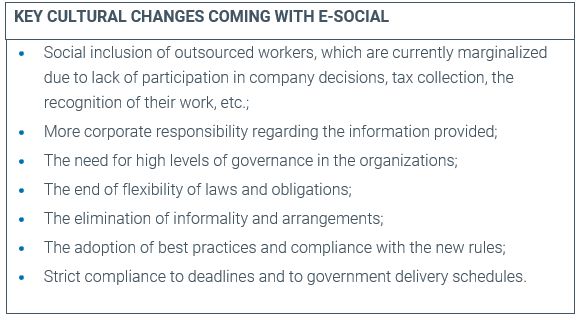The closer we get to eSocial's starting date, the more we discuss the technical issues linked to it; and this is necessary. But we have seen few discussions about the cultural changes that the new system will require of companies - and we are talking about all Brazilian companies.
Since it
began to develop in 2007, eSocial has provoked a series of debates
about how companies would have to adapt their technological
systems, in order to send the information through a single system.
However, almost a decade later very little has been said about the
cultural changes it will require of companies.
Background
For those who don't remember, eSocial is a Brazilian
government project that will unify the sending of employer and
employee data starting in 2018. It is a tool for fiscal
obligations, social security and labor obligations. This single
system will replace the need to do separate reports for the
National Institute of Social Security (INSS, by its acronym in
Portuguese), the Federal Internal Revenue Service, the Ministry of
Labor and Social Security of Brazil.
The use of the new system will be mandatory, as of January 2018,
for all companies that had more than R$ 78 million in revenue in
2016, and for all other companies as of July of the same
year.
Among its main goals, eSocial aims to ensure labor and social
security rights, to simplify the fulfillment of obligations by
employers and to improve the quality of the information on social
security and labor relations received by the federal
government.
The eSocial effect
The market's expectation is that eSocial will reduce
bureaucracy and increase corporate responsibility in providing
information. The system will have a major impact in corporate
management and governance, since eSocial will make labor
regulations clearer and more individualized.
First and foremost, it is always good to remember that the system
does not change the law. On the contrary, it was created to help
comply with the law. This means that it should make certain
practices that were common in Brazilian institutions – like
companies and employees abusing flexibility with the famous
"jeitinho" (the Brazilian way) - quite difficult, if not
impossible.
Cases like, for example, when employees are paid for their vacation
period but continue working and go on paid vacation at another
period, are not illegal actions, but will no longer be possible
with eSocial in operation. This is because the whole regulatory
environment will be guided by the full operation of functions that
are currently adjusted or deviated from its reality.
The question that must be asked is, in addition to the changes in
systems, are the companies culturally and organizationally prepared
for eSocial? It is possible that most companies are not and, if
that's the case, they need to get ready now.

From an organizational point of view, companies must view
eSocial as a platform for processes restructuring. It will be an
important component to eliminate informalities and arrangements,
ensuring compliance with the law.
To illustrate, in Europe, it is common to block corporate e-mails
outside of business hours or during employees' vacation period,
or also, not allow the employee to enter the company while on
vacation. These are points that can be controlled by the new system
and for which companies must prepare.
Taking action
As mentioned before, there are processes and cultural aspects
to modify before the arrival of eSocial. It is also necessary to
plan how the company will absorb such changes so it avoids facing
serious consequences in the future.
Not being properly prepared or maintaining good practices can lead
companies to receive labor and social security notices of
infractions, in addition to tremendous risk to the company's
finances and reputation. This is because with eSocial, supervision
will be simplified, making it easier for the government to audit
– and these will be more frequent and stricter.
Alternatively, companies can be prepared, and take the opportunity
to ensure the use of best practices and compliance with the new
rules. It's a matter of choice.
The content of this article is intended to provide a general guide to the subject matter. Specialist advice should be sought about your specific circumstances.

